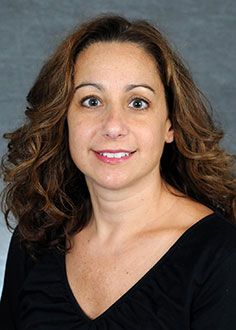
Marcia Firmani understands the importance of mentorship for budding scientists. During her graduate training at UC Berkeley, Daniel A. Portnoy, Ph.D., a professor of biochemistry, played an influential role in encouraging her dissertation research. “He once told me that there are two kinds of scientists,” she said. “He said that ‘There are good scientists and bad scientists. Bad scientists try to prove themselves right and good scientists try to prove themselves wrong.’ Because of Dr. Portnoy’s influence and support, I knew that I wanted to pursue a career as a good scientist.”
And so she has. Firmani, Ph.D., M.S.P.H., is the newest faculty member of the Clinical Laboratory Science (CLS) program at the George Washington University School of Medicine and Health Sciences (SMHS), where she will serve as assistant professor and assistant program director for CLS. Her career has taken her fromthegenetics department at Yale University to the National Biodefense Analysis and Countermeasures Center (NBACC), with stops at Tulane University’s School of Public Health and Tropical Medicine; University of California, Berkeley’s department of plant and microbial biology; the Louisiana State University Health Sciences Center; and the University of Wisconsin, Milwaukee. And now, SMHS is thrilled to welcome her to CLS, which celebrates its 70th anniversary this year.
According to Joseph Bocchino, Ed.D., M.B.A., interim senior associate dean for health sciences, Firmani brings new perspectives to GW, where the diversity of her background will facilitate her role in determining the future of the clinical lab sciences program. “She’s a very strong collaborator,” said Bocchino. “We’ll be looking to her to build bridges between the basic sciences and the clinical teams with which she operates,” he said.
Firmani has taught various undergraduate CLS courses and graduate-level biomedical sciences courses, most recently at the University of Wisconsin, Milwaukee (UWM), where her repertoire included medical microbiology, molecular diagnostics, and molecular pathology. She also directed a research laboratory at UWM, where she conducted NIH-funded research on Mycobacterium tuberculosis.
In 2010, after eight years in academia, Firmani learned that NBACC was seeking principal investigators for their bacteriology division. It sounded like an ideal opportunity to work with organisms in a Biosafety Level-4 environment, so she took a post in Frederick, Md. During that time, she conducted and managed several research projects involving biothreat agent characterization.
After two years at NBACC, Firmani found herself yearning for the flexibility of an academic environment. She missed the interaction with students – “you do, every now and again, feel like you’re making a difference in someone’s life,” – but it was the intellectual freedom that drew her back to academia. “If you think of a novel idea in your field, you can pursue it and see where it goes. Maybe take some detours along the way,” Firmani said.
Despite a demanding teaching schedule that will include courses in microbiology, molecular diagnostics, hematology, and laboratory operations, research remains Firmani’s passion and she looks forward to beginning collaborations with other SMHS researchers. Her first stop will likely be the East Coast AIDS and Cancer Specimen Resource (ACSR), which is housed on the ground floor of Ross Hall. She also plans to apply for grants to continue the Mycobacterium tuberculosis research that she began during her Ph.D. at the University of California, Berkeley.
Sylvia Silver, D.A., Director of the CLS program and principal investigator of the East Coast ACSR, says she is ecstatic to welcome Firmani to SMHS’s Department of Clinical Research and Leadership. “Marcia has a dynamic personality and will be such an asset to the program and to SMHS. I am looking forward to our partnership,” she said.
As program coordinator, Firmani is responsible for coordinating all aspects of the program, including evaluating the local and national clinical affiliates where CLS students, whose coursework is completed online, do their clinical rotations. “I’m eager to building relationships with everyone in those laboratories so that when our students are working there, I can truly advocate for them,” she says.


